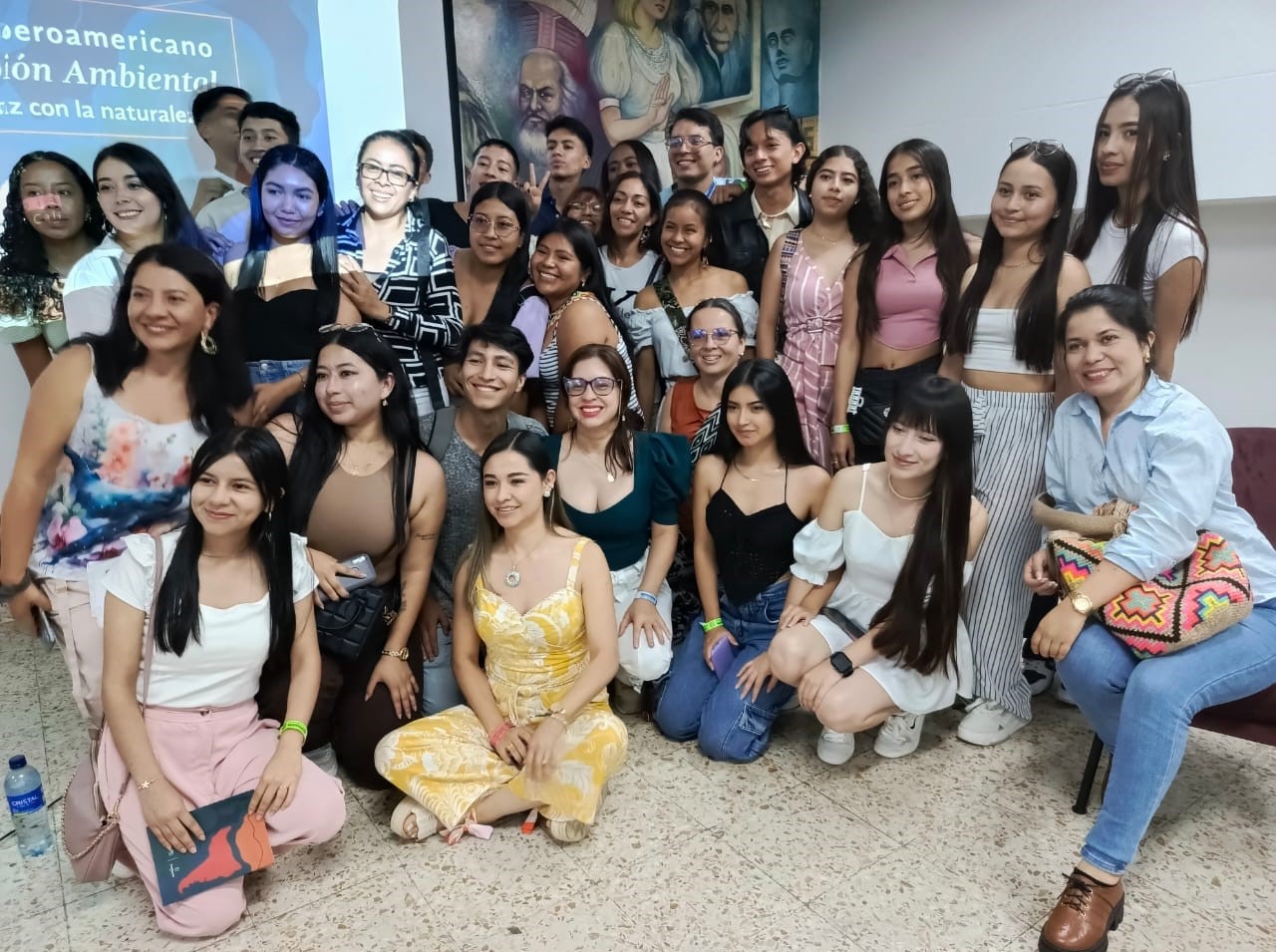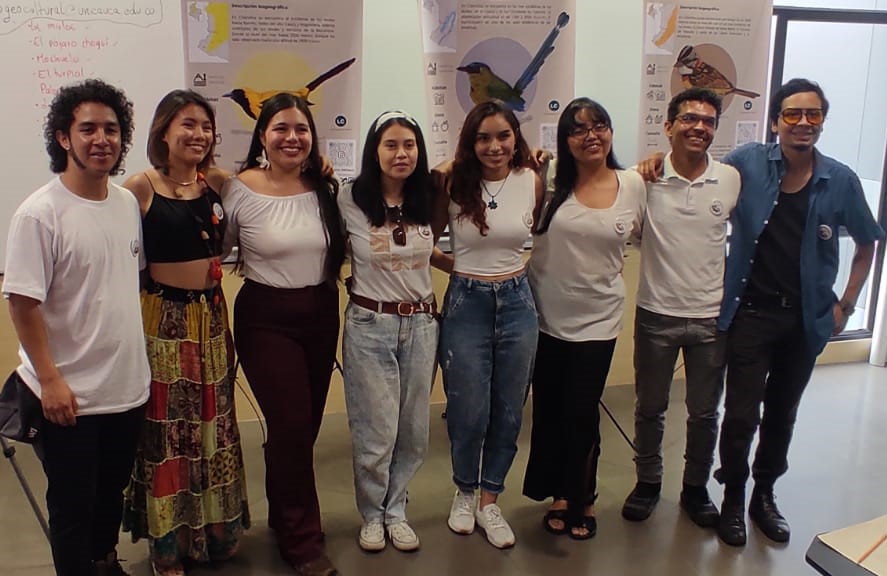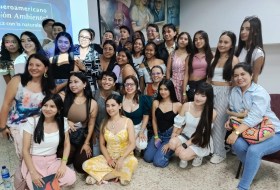News
Unicauca is a strategic partner of the VIII Ibero-American Congress on Environmental Education.
Professors and students from Biology, Bachelor's in Natural Sciences and Environmental Education, Geography, and the Doctorate in Environmental Sciences presented their papers during the event organized by the Ministry of Environment and Sustainable Development in Cali.
The VIII Ibero-American Congress on Environmental Education, 'Cultures and Territories in Peace with Nature,' held from October 16 to 18 in Cali, was a key meeting for reflection and building joint paths that allow our pluriethnic, diverse, and multicultural region to advance toward well-being and peace in the territories.
The Congress was organized by the Ministry of Environment and Sustainable Development as a Pre-COP event, with the University of Cauca as one of the strategic partners, participating in the Academic Committee with six professors from the Faculties of Natural, Exact, and Educational Sciences; Human and Social Sciences; and Economic and Administrative Sciences.

Provided photo
In this way, the University of Cauca contributed 12 presentations from professors and students in the programs of Biology, Bachelor's in Natural Sciences and Environmental Education, Geography, and the Doctorate in Environmental Sciences. Additionally, a workshop proposed by the Territorial and Socio-environmental Geographies research group was included.
The professors who participated in the Academic Committee are: Lorena Alvear Narváez from the Department of Biology; Mercy Lorena Urbano Pardo from the Department of Geography; Ernesto Hernández from the Department of Intercultural Studies; Carlos Corredor from the Department of Economic Sciences; and Diana Marcela Ruiz and Cristian Méndez from the Doctorate in Environmental Sciences. The committee also included Adriana Castellanos, a student in the Doctorate in Ethnobiology and Biocultural Studies.

Provided photo
For her part, Professor Lorena Alvear Narváez moderated the panel of Axis 2 titled 'Environmental Education as a Builder of Environmental Citizenship through Community Participation,' which addressed the importance of art, community participation, recognition of non-hegemonic knowledge, innovation and research, and environmental health.
The workshop, led by the Territorial and Socio-environmental Geographies research group, focused on the theme of geophonies in bird observation: recognition and importance of birds in the environmental conservation of southwestern Colombia. It had approximately 50 attendees, and the workshop facilitators were: Erica Bianey Pizo, Meyson Anggye Vallejo, Gabriela Franco Medina, Yamid Hurtado López, María Fernanda Rocha Piso, David Santiago López, Sarita Isabella Salazar, and Carlos Mesías.
We present the Final Declaration of the VIII Ibero-American Congress on Environmental Education, which is a call to action and an opportunity to promote Peace with Nature and advance toward Well-being in our nations: https://bit.ly/4hhlZhF.
Presentations and Authors
Production of Educational Materials: A Pedagogical Approach to Redefine Environmental Education Teaching in Ethnic Contexts by Luis Antonio Rosas Guevara.
Integral Socio-Ecological Management Model of the Territory: A Community Approach by Afro-Pacitan Women Towards the Conservation of the Territory and Its Biodiversity in Southern Cauca (Colombia) by Luis Antonio Rosas Guevara.

Provided photo
State of Knowledge on Biodiversity with Emphasis on Herpetofauna in the Indigenous Reserve of Puracé by Gisell Camila Villota Ortega.
Ethnoeducational Pedagogical Practice in Cultures, Territory, and Nature by Martha Mendoza Vargas.
Rural Environmental Education and Water by Yanlika Aurora Vidal Pinilla and Gehovell Juliana Vidal Pinilla.
A Study on the Socio-Environmental Practices of Indigenous Women from the Kisgó Reserve by Anggy Meison Vallejo Andrade.
Incorporating Theoretical and Methodological Elements from a Gender Perspective in an Initial Teacher Training Program at a Public University by Noah Meneses Castillo.
Environmental Thinking for University Professors from a Critical-Situated Stance by Luz Adriana Rengifo Gallego, Niny Johanna Potosí Estrada, Yurany Andrea Realpe, and Claudia Alejandra Bermúdez.
The School Store: A Proposal from the Reflection of Future Teachers on Environmental Education and Knowledge Dialogue by Sebastián Yunda Balcázar, Fabián Andrés Yunda, Karen Tatiana Meneses, and Lisbeth Lorena Alvarado.
Photography: A Strategy to Dialogue About the Environment by Karol Lizette Sánchez Meneses.
Exploring and Co-Constructing University Environmental Territories in the Tulcán Sector by María Alejandra Alegría Muñoz, Geovanny Andrés Guacho Coro, Karenn Viviana Hidalgo Rendón, Adrián Alfonso Pazu Passu, and Nilsa Lorena Alvear Narváez.
Written by: Communications Management Center.


